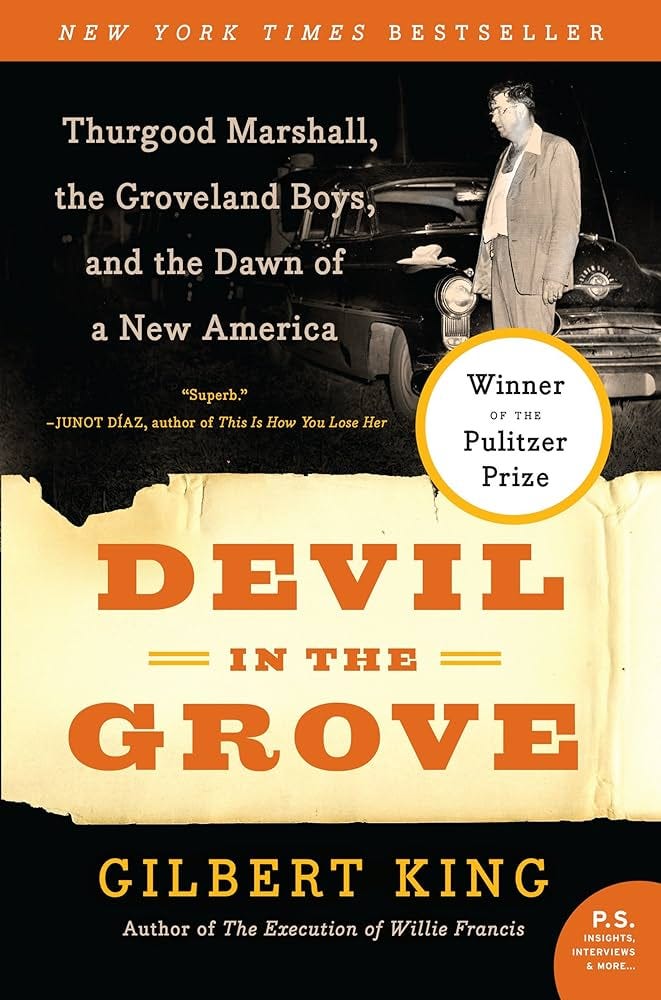What to Read Next: What does justice look like?
Issue #335, featuring award-winning true crime

Happy Friday, readers!
Today’s newsletter features two emotionally heavy non-fiction books. Gilbert King’s Devil in the Grove (2012) first appeared on my radar because it won a 2013 Pulitzer for General Non-Fiction. Kim Cross’s In Light of All Darkness (2023) was nominated for this year’s Edgar Awards; though it didn’t win, it certainly had my vote after reading through all the finalists.
Racial violence, sexual violence, kidnapping — this stuff is not easy to digest. But as Louise Penny has written numerous times in her Gamache novels, it’s in the dark and broken places that the light shines forth most brightly. In the midst of that darkness are portraits of courage, heroism, and compassion, making these stories worth the full measure of our attention.
Let’s jump in.
Devil in the Grove: Thurgood Marshall, the Groveland Boys, and the Dawn of a New America by Gilbert King
Before starting this book, I had no knowledge about the “Groveland Four” and this notorious case of false accusations in the deep south. Had I known I was in for a story with more jaw-dropping twists and turns than most fictional thrillers, I would’ve read it much sooner.
Seriously, don’t google any of it before reading! I literally found myself mouth agape in my kitchen a few times. It’s bonkers.
That said, I can give you the gist of the story. In 1949, four Black men were accused of raping a young white woman in central Florida, an especially awful place to be a Black person in the middle of the 20th century. The uniquely evil sheriff of Lake County arrested the first four Black men he could find and over the next few years a series of violent crimes, preventable tragedies, and high-tension court cases laid bare how unjust society was in that era.
Thurgood Marshall doesn’t play as big a role as the subtitle would make it seem, but his involvement raised the stature of the case, bringing it national awareness and media coverage. Solving crimes like this was an important element of racial justice, perhaps even moreso than Marshall’s better-known Civil Rights cases (like Brown v. Board of Education). Another element of justice is simply that the world would know what happened; the truth does in fact matter, even if it comes years or decades later.
Devil in the Grove often reminded of Fever in the Heartland, one of my 2023 favorites, in that it captured an important slice of America’s racial history within a tightly-focused, gripping narrative. It’s never an easy read, but these types of stories are vitally important for us to understand our national heritage.
In Light of All Darkness: Inside the Polly Klaas Kidnapping and the Search for America's Child by Kim Cross
The ‘90s had to have been a weird time for parents of young children. “Stranger danger” was everywhere in large part due to cable news networks that were newly 24/7. The case of Polly Klaas, in particular, sent shockwaves through the media and the general public — and forever changed the way child kidnappings were covered and investigated.
In October 1993, in the middle of a sleepover, twelve-year-old Polly Klaas was taken from her Bay Area home. After two months of searching, her killer was arrested and her body was found.
Those are the rudimentary facts. Where the author spent most of her time, though, was on the investigation process. How do different organizations (police departments, FBI, volunteer groups) work together in a high-profile case like this? Which pieces of evidence are most important? How does psychological profiling factor in? How do you communicate public safety without the panic-inducing hyperbole?
Amidst answering these questions, Cross also explored the legacy of this case. Klaas’s kidnapping and murder forever changed how child abductions were handled, both by investigators and by the media — and not always for the best. Though well-intentioned, the mass publicization of stranger danger led to far more fear and unnecessary sheltering than a true reduction in the already extraordinarily low number of this type of crime.
Kim Cross is up-front about the fact that she’s not a true crime writer; she’s a journalist and historian drawn to interesting stories. That fact alone gives this book a different tenor than many others in a genre that’s rife with poorly-written, looky-loo narratives. With compassion towards the Klaas family and an objective examination of what happened, In Light of All Darkness stands out and should have won the Edgar for Best Fact Crime. If you can handle the subject matter, it’s well worth reading.
Thanks so much for your time and attention. I deeply appreciate it.
-Jeremy



Glad to see more attention for Kim’s book. She taught a class I was in while she was finishing up that book and I know it took a toll on her to write it.
Thank you, Jeremy - I am definitely going to put these both on my reading list. As 90s kid, I have had recent discussions with friends the same age about the weird obsession our parents seemed to have about kidnapping and abduction. It was always the big fear and the big lecture and we spent alot of time being worried about being taken and of course not understanding why. I’m really looking forced to reading Cross’ book and gaining some insight into WHY our parents may have been so fearful during that era!